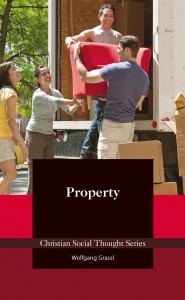 Étienne Cabet, a French philosopher and founder of a utopian socialist movement, once said: “Communism is Christianity.” The concept of property has existed longer than Western Civilization; trying to understand what property is and who can claim it has been an important issue for centuries. But, what is the Christian view of private property and ownership?
Étienne Cabet, a French philosopher and founder of a utopian socialist movement, once said: “Communism is Christianity.” The concept of property has existed longer than Western Civilization; trying to understand what property is and who can claim it has been an important issue for centuries. But, what is the Christian view of private property and ownership?
Cabet, and others who believe that Christianity supports the concept of communism or socialism, base their opinion on one particular passage of Scripture. In Acts: 32-37, Luke tells us that no believer:
Claimed that any of his possessions was his own, but they shared everything they had…There were no needy persons among them. For from time to time those who owned lands or houses sold them, brought the money from the sales and put it at the apostles’ feet, and it was distributed to anyone as he had need. NIV
One interpretation of this passage says that the Church does not support private property, but the Christian perspective on the institution of property is not so simple. Wolfgang Grassl, professor of business administration at St. Norbert College (De Pere, Wis.), addresses this complicated and controversial issue in Property, the latest in the Christian Social Thought series from the Acton Institute.
Grassl points out that the issue of property is absolutely central to Western civilization and Christian social thought. He goes as far to say that understanding property is essential in order to understand the human person. Grassl quotes Pope John Paul II, who addressed the complexity of this issue in Centesimus Annus. He said:
This right [to private property], which is fundamental for the autonomy and development of the person, has always been defended by the Church up to our own day. At the same time, the Church teaches that the possession of material goods is not an absolute right, and that its limits are inscribed in its very nature as a human right.
Property begins by asking “the essential questions” regarding property, such as: “Is property restricted to tangible assets?…May the State infringe on the property rights on individuals? Can there be freedom without private property?” Grassl answers these and other questions by looking at the teachings of Scripture, philosophers, theologians, economists, and the Church. He takes direct quotes from those who have spoken on the subject as well as passages from Scripture to clarify the Christian perspective on property. Finally, Grassl applies the Christian explanation of property that he has outlined in his essay, to several contemporary issues: eminent domain, intellectual property rights, and business ownership. Property resolves conflicts over the social teaching on property and offers a simplified and relevant explanation of how Christians should view property. The eBook is available at Amazon and the softcover will be available soon at the Acton Book Shop.

